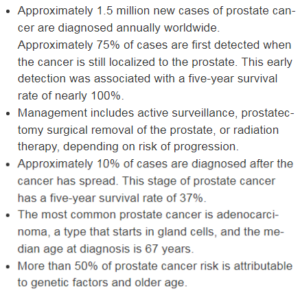
Don’t be fooled that an early, slow growing prostate cancer is nothing to worry about and can’t be deadly.
Don’t let the relative lack of publicity regarding prostate cancer trick you into believing that this disease isn’t as deadly as breast cancer.
You’ve probably heard the term “slow growing” when the topic of prostate cancer comes up.
You might even know a man who’s been diagnosed with prostate cancer — but his surgery is scheduled for several months out. Don’t be deceived. This is a deadly illness for many patients.
Prostate Cancer May Grow Slowly, But…
“Most prostate cancers grow relatively slowly and develop over years,” begins Jonathan W. Simons, MD, President and Chief Executive Officer of the Prostate Cancer Foundation, David H. Koch Chair.
“However, at some point these tumors often become exponentially more aggressive and gain the ability to spread and metastasize,” continues Dr. Simons.
The spread can reach the bones and other organs, even the brain.
Yes, this cancer can get into the bones and brain tissue if not treated in time.
“Some men develop tumors from the start that are rapidly growing that are prone to metastasize,” adds Dr. Simons.
“Therefore, early detection is critical to intervene while the disease is still localized to the prostate and potentially curable.”
Symptoms of Prostate Cancer
• Frequent urination or the feeling to urinate but nothing comes out.
• Trouble with initiating urination.
• Weak urine stream.
• Pain or burning when urinating.
• Impotence or painful ejaculation
• Blood in the semen or urine
• Rectal pain or pressure

Shutterstock/Chinnapong
• If the cancer has spread to the bones, the patient may feel pain in the back, pelvis or legs. The key to survival is to catch this disease when it’s early.
Yearly PSA values and a complete exam are crucial, no matter how fit and healthy a man believes he is.
Conclusion
When caught early, the cure rate for prostate cancer is excellent — far better than when it’s caught at a later stage.
Early detection significantly improves treatment outcomes.
With prompt intervention, many patients achieve successful management of the disease and maintain a high quality of life.
Men should not feel embarrassed about seeing their doctor for concerning symptoms that could indicate prostate cancer.
Symptoms such as difficulty urinating, frequent urination or blood in the urine should prompt a medical consultation.
Healthcare professionals are experienced in addressing sensitive issues and provide a supportive environment for discussing symptoms.
Prostate cancer screening, including PSA tests and digital rectal exams, can detect the disease at an early stage when treatment options are most effective.

 Dr. Simons is an internationally recognized physician-scientist, oncologist and acclaimed investigator in translational prostate cancer research. Prostate Cancer Foundation.
Dr. Simons is an internationally recognized physician-scientist, oncologist and acclaimed investigator in translational prostate cancer research. Prostate Cancer Foundation.
 Lorra Garrick has been covering medical, fitness and cybersecurity topics for many years, having written thousands of articles for print magazines and websites, including as a ghostwriter. She’s also a former ACE-certified personal trainer.
Lorra Garrick has been covering medical, fitness and cybersecurity topics for many years, having written thousands of articles for print magazines and websites, including as a ghostwriter. She’s also a former ACE-certified personal trainer.
.








































